#anyway i hate to do the snake form for an antagonistic being however. it would make sense for the abyss to do that to kara
Text
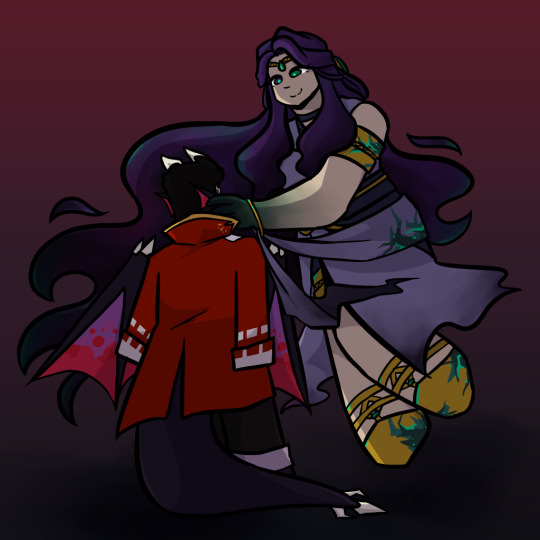
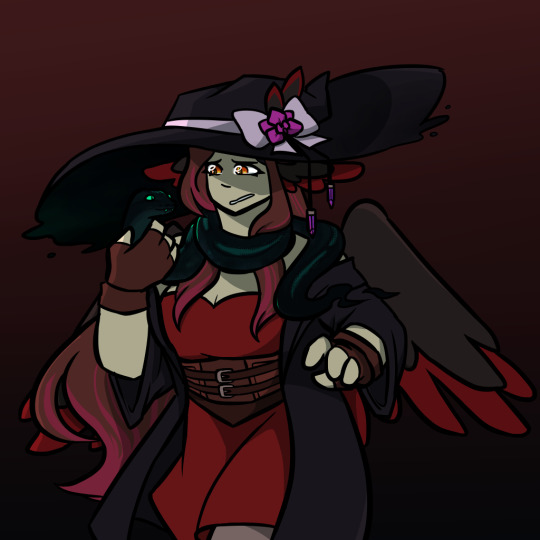
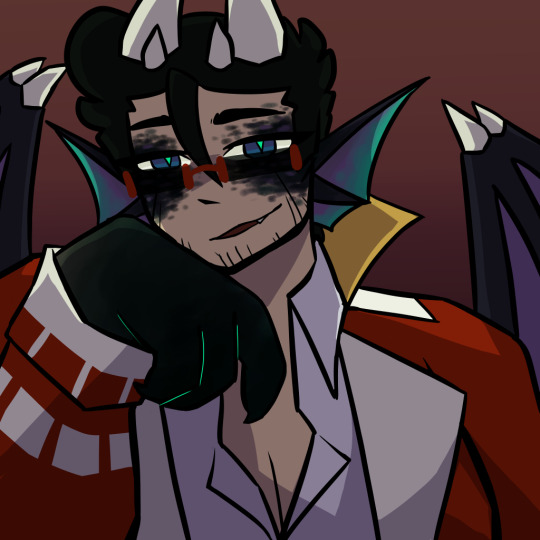
haha you know what would be Fun (cruel)
the abyss but it shows itself to the hunters by taking the form of someone important to them
jordan thinks this is normal. whats one more different flavor of ianite? he is home. his lady is here. all is well
kara though? she is seething. the abyss taking the form of her snakes (which function as familiars. to me) its not even trying to fool her, just taunting. her hat usually acting as a lil pocket space where her familiars chill. the abyss cutting off her access to that, claiming it for itself. popping in and out and swapping between looking like her different snakes
also theres no world where the abyss doesn't go jordan mode on the rescue squad. effective multitarget attack
#mcyt#captainsparklez#ianite#karacorvus#marsh tries#btv abyss au#perhaps kara specifically would also be hit with the teensy dragon mode sparklez#since he sometimes invites himself into her hat soup#anyway i hate to do the snake form for an antagonistic being however. it would make sense for the abyss to do that to kara#comes from a place of affection they are loved and so can be used
75 notes
·
View notes
Text
Music Monday
Tagged by @josephseedismyfather
Tagging @socially-awkward-skeleton @shallow-gravy @inafieldofdaisies @strangefable @strafethesesinners @direwombat
@derelictheretic @titiagls @wrathfulrook @carlosoliveiraa @adelaidedrubman @thewanderer-000 @henbased @josephslittledeputy @direwombat @g0dspeeed @nightbloodbix @afarcryfrommymain @voidika @ladyoriza @florbelles @vampireninjabunnies-blog @minilev @snake-in-the-garden @softtidesworld @onehornedbeast @cassietrn @chazz-anova @megraen @deputyash @dephellseed @deputy-morgan-malone @skoll-sun-eater @fourlittleseedlings @la-grosse-patate @cloudofbutterflies92 @starsandskies and @i-am-the-balancing-point + anyone else who wants to join in. Here's my taglist.
Three songs for The UnTitledverse, Wings And Horns' original spin off trilogy and Far Cry The Silver Chronicles below the cut.
First is "My Ordinary Life" for the main antagonist of The UnTitledverse, Zachariah the Orchestrator, the "Hand at Fate's Table" and the second-borne Eldritch that is the center point of majority of the multiverse's issues.
youtube
"They tell me that I'm special, I smile and shake my head
I'll give them stories to tell friends about the things I said
They tell me I'm so humble, I say I'm turning red
They let me lie to them and don't feel like they've been misled
They give so much to me, I'm losing touch get me?
Served on a silver platter, ask for second they just let me
They tell me I'm a god, I'm lost in the fascade
Six feet off the ground at all times I think I'm feelin' odd
No matter what I make, they never see mistakes
Makin' so much bread, I don't care that they're just being fake
They tell me they're below me, I act like I'm above
The people blend together but I would be lost without their love
Can you heal me? Have I gained too much?
When you become untouchable you're unable to touch
Is there a real me? Pop the champagne
It hurts me just to think and I don't do pain."
Silva may not be aware of it, but she actually has a rivalry with the Voice, or at least her supernatural Third Eye does. Abridged explanation of the Third Eye: some mystical entity commonly tied to the human soul but doesn't necessarily need to be to help its user, usually just retains memories and personality to give some back to the renewed soul upon reincarnating so the variants of the person don't become carbon copies, however instances like Silva and Paul who don't have a soul (due to the circumstances of their "births") they instead only build up their own Third Eye to protect themselves, which gives them back their memories, personality and skills into their next lives deep in their subconscious, so while they don't consciously remember most familiar things they instinctively do and gravitate towards that. The Third Eye also has an OP mode and can enhance the user who is aware and works symbiotically with it in ways humans back in the beginning of the multiverse could do. Paul realized this and gave Silva some subtle lessons (never explicitly saying what it was for) so Silva just thought it was meditation to make her more spiritual with her soul or something and doesn't actually realize until much, much later in her life that she's powerful enough to kill a God if she wanted to. There's a lot more for the Third Eye but I'll explain in a more detailed post.
Anyway, the Voice genuinely hates Silva for constantly foiling its plans in some shape or form, especially by the time of Silva's Hope, as the Voice hasn't exactly made itself look capable of governing one corner of the universe to its extremely cruel and unforgiving superior. And since the Voice is very biased and hypocritical on why "a deputy woman trying to live a normal life is more deserving of torment and needless suffering than the the prophet who killed his daughter for it and the other prophet who gaslit, gatekeeped, manipulated, mansplained, manwhored and manslaughtered his way through life", once Silva becomes aware of the Voice, its on sight. Anyway song below:
youtube
"Kill me again, again and again
But I come back knowing so much more
Learning all your tricks
I'll make you sick
Because the truth is...*
I'll make you quit."
"Try to stay [first], [have to] stay first**
You're still good-good, admit to this
Don't fight anymore, it's such a snore
One more step, and I'll make it war."
"And I still love the way I "hurt" you."
"It's determination, whoa-oh-oh-oh, oh-oh-yeah
Whoa-oh-oh-oh, whoa-oh-oh-oh-oh, oh-oh-yeah.
I love the way, I love the way
I love the way you keep on trying
I love the way (I love the way), I love the way (I love the way)
I love the way you keep on dying."
(* = Obviously I had to emit Sans name due to that probably not being the Voice's name
** = The Voice is against Silva, and since Frisk is from Undertale, I had to adapt the lyrics here a bit)
A song for the unnamed original trilogy I'm working on, which spins off from the events of Wings And Horns, but focusing on two characters who appeared in it, unnamed but can confirm they're both women, with one being trans. This pair are the first humans to have ever explored the Multiverse, and the trilogy will be following their story in life, navigating the aftermath of the abolishing of the soulmate system, discovering + exploring the Multiverse, and seeking out the Wheel of Reincarnation in the Afterlife, while facing internal and external problems, the most prominent being the Mad Kin of Carnage himself, Discord.
youtube
"I'm born to run, down rocky cliffs
Give me grace, bury my sins
Shattered glass and black holes
Can't hold me back from where I need to go
Whoa-oh-oh, oh-oh-oh-oh-oh
Oh, oh, oh-oh-oh-oh
Yellow hills and valleys deep
I watch them move under my feet
Stranger things, have come and gone
To see the world and take the throne
Don't hold back
Oh, I won't hold back
I'm gonna live my life like I'm gonna die young
Like it's never enough, like I'm born to run
I'm gonna spend my time like tomorrow won't come
Do whatever I want, like I'm born to run
I wanna see Paris (Hey), I wanna see Tokyo
I wanna be careless (Hey), even if I break my bones
I'm gonna live my life like I'm gonna die young
Like it's never enough, like I'm born to run.
A winding road, where strangers meet
To feel the love of a warm drink
My body moves, it's speaking loud
Don't have to say what I'm thinking now
Don't hold back
Oh, I won't hold back
I'm gonna live my life like I'm gonna die young
Like it's never enough, like I'm born to run
I'm gonna spend my time like tomorrow won't come
Do whatever I want, like I'm born to run
I wanna see Paris (Hey), I wanna see Tokyo
I wanna be careless (Hey), even if I break my bones
I'm gonna live my life like I'm gonna die young
Like it's never enough, like I'm born to run.
All these things, I've seen and done
I live my life like I'm born to run
All these things, I've seen and done
I live my life like I'm born to run
All these things, I've seen and done (I was born, born, born, born, born to run)
I live my life like I'm born to run (I was born, born, born, born, born to run)
I'm gonna live my life like I'm gonna die young
Like it's never enough, like I'm born to run
I'm gonna spend my time like tomorrow won't come
Do whatever I want, like I'm born to run
I wanna see Paris (Hey), I wanna see Tokyo
I wanna be careless (Hey), even if I break my bones
I'm gonna live my life like I'm gonna die young
Like it's never enough, like I'm born to run.
Oh, oh, oh, oh-oh-oh-oh-oh-oh
Oh, oh, oh-oh-oh-oh
Oh, oh, oh, oh-oh-oh-oh-oh-oh
Oh, oh, oh-oh-oh-oh!"
#music monday#the untitledverse#oc: zachariah the orchestrator#big bad of the untitledverse is jealous of the attention humanity gets#far cry the silver chronicles#far cry 5#oc: silva omar#fc5 the voice#the voice#hell its not even joseph that silva hates its the fact that joseph represents the voice and that's what her third eye recognises#but since silva isn't aware of the voice's existence#she goes to put this hate that she never held before towards joseph (and justifies the reasoning behind it by pointing at his actions)#wip: wings and horns#original unnamed trilogy#original works#coming up with titles is hard#but i will persevere past this#also funny how this trilogy is the planned end yet chronologically timeline-wise the beginning of the stories (not excluding WAH)
16 notes
·
View notes
Text
Claudia—Just what’s so bad about Dark Magic anyway?
Ah, Claudia. Everyone’s favorite dorky Dark Mage. Even as she continues her journey to villainy, we can’t help but find her at least a little adorable.

She’s undoubtedly likable, which makes a lot of what she does even more unsettling. We’re used to villains like Viren, who are so obviously villains even if they have somewhat good intentions.
But Claudia? She seems to have a good heart and cares about people outside of simply what they can do for her. Even if she may not reciprocate Callum’s feelings, she’s still clearly fond of him.
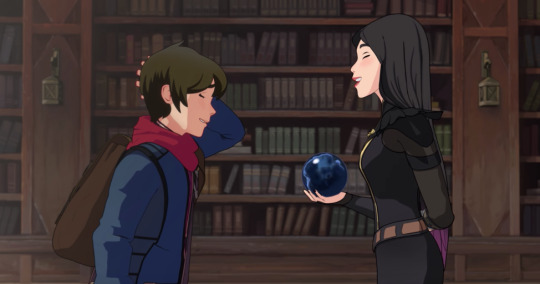
In S2, she’s genuinely supportive of her brother, telling him that them being alive matters more than succeeding in their missions. She also comforts Ezran and even helps mend his relationship with Callum, reminding him just how lucky they are to have each other.
As I lay out here, Claudia very much resembles Callum in the earlier chapters; both are bookish nerds, adorably awkward, and with an affinity towards magic. And while Callum starts to move away from this resemblance, we can see why Claudia is so likable.
Claudia can be caring and sweet. That’s why it’s so tragic and painful to watch her continue to cross moral lines, to the point that she is now thoroughly antagonistic to Team Zym, with any hope of total redemption being slim at best.
Now, I can’t talk about Claudia without first talking about Dark Magic. You see, while Dark Magic is terrible, the show doesn’t explicitly lay out exactly why it’s terrible. It merely illustrates how it works, portrays people using it for a variety of reasons, and then lets the audience decide how it feels about it. This is all intentional—Aaron and Justin have expressly stated they didn’t want to push too hard on the point that Dark Magic is wrong, instead leaving it for fans to make up their own minds. As a result, some fans sincerely believe there’s nothing wrong with it.
And that’s why we have Claudia. Someone who is sweet and sincere, relatable enough that you picture being friends with.

Someone who also sees nothing wrong with Dark Magic, defends using it, and even tries to use it for supposedly good reasons.
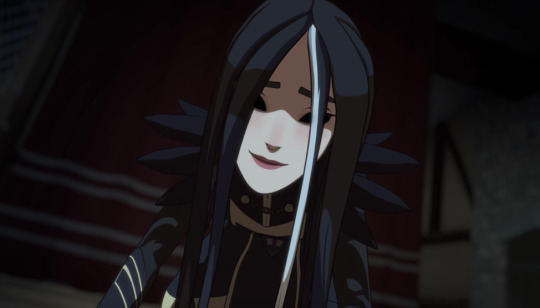
Because there’s no explicit reason given for why Dark Magic is so uniquely evil, the onus is on us, the viewers, to figure this out on our own.
There have been several fan attempts at explaining why Dark Magic is so bad, but for me, at least, I always felt we were missing something.
It might be wrong because it requires Dark Mages to sacrifice innocent creatures. But then again, humans in the real world consume animals all the time.
The logical response to this is that unlike, for instance, eating, Dark Magic is not natural nor necessary. However, we do all sorts of unnatural things with animals as well. For instance, we’ve created animal glue, whale oil for lamps, and leather from cattle. We’ve used creatures as working animals as well as for their cells to develop cures and vaccines. Without arguing that Dark Magic is defensible, this just helps illustrate the larger point that there must be something else that makes Dark Magic worse than any of this.
Another argument I’ve heard is that it permanently destroys magical habitats. The reason why the Human Kingdoms are much less magical than Xadia is that Dark Mages have poached and pillaged all the creatures they could. This could all very well be true, but it’s also what human beings do on the regular in the real world; as a rule, wherever industrial civilization lays down its roots, animal extinctions follow, intentionally or not. If Dark Magic is supposed to be an indictment of the way our society works today and the ecological problems we’ve caused, then we deserve it.
But many of us (hopefully) are working to change that, even if it means making life harder for us. The solution to climate change ultimately comes in the form of learning to live sustainably and in harmony with the world around us. One day, we’ll find a balance to our way of life, but if we can, why can’t Dark Mages? Why can’t Dark Magic users learn to moderate and regulate their behavior the way we could, and sustainably find ways to use the same magic that elves and dragons take for granted?
It also doesn’t help that characters who hate Dark Magic the most are also hypocritical about it. Sol Regem argues that Dark Magic causes the death of innocent creatures…while threatening to burn down a city filled with innocent people. Perhaps he opposes Dark Magic, not for ethical or benevolent reasons, but because it shifts the balance of power too much in favor of these so-called “lesser beings.” So, we can’t take his assessment of Dark Magic with anything more than a grain of salt.
But, at the end of the day, Dark Magic is a bad thing. Even if we can’t place our finger on exactly why, we know there’s just something wrong with it.
And that’s where Claudia comes in.
She too doesn’t think there’s anything wrong with Dark Magic— Why should she? It’s no different than anything else humans do, it helps keep people alive, and keeps us from starving and being helpless. Whether you eat them or take their magic, they’re just a resource.
But over time, as she relies more on Dark Magic as her universal problem-solver, we see her cross more and more ethical boundaries.
In most of the first two seasons, Claudia’s uses of Dark Magic come entirely from whatever she happens to carry in her bag or little critters she finds here or there.
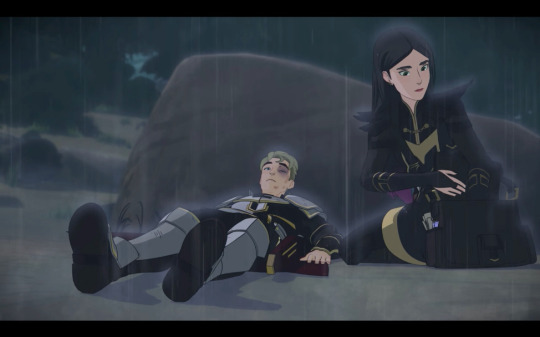
And, for the most part, she tries to do the right thing. Claudia understands how powerful Zym could one day become, and from her perspective, there is a risk that he could, in her words, reign “death and destruction down on all of us.”
Claudia honestly believes that finding the Dragon Prince and bringing the princes home is what’s best for Katolis. Initially, she believes that Rayla had kidnapped the boys, and later she still insists her actions are for the greater good.
She’s willing to cross certain lines, such as manipulating and betraying Callum and Ezran, but shows signs that she regrets doing so.

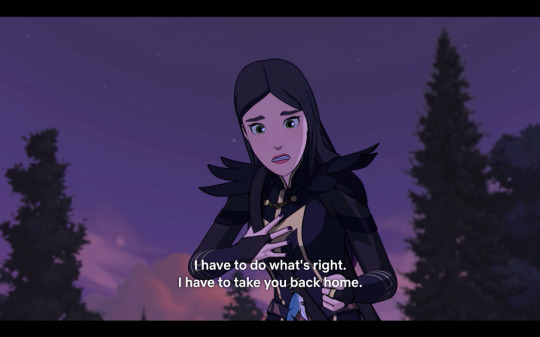
But she starts off at crossing these relatively smaller moral lines, before working her way to more reprehensible behaviors. By the end of S2, she crosses a line when she uses a living creature to cure Soren’s paralysis.
After this moment, we see that she’s willing to justify an ever-growing list of horrible actions without any regrets. Whether it’s overthrowing and imprisoning Ezran, wiping out Lux Aurea, or turning the entire army into mindless rage-fueled minions, and even possibly letting Viren’s illusion strike down Ezran.

By the time she resurrects Viren, most likely by using a poor unfortunate elf who stumbled upon her, she’s past the point of feeling remorse for what she feels she has to do.
And why?
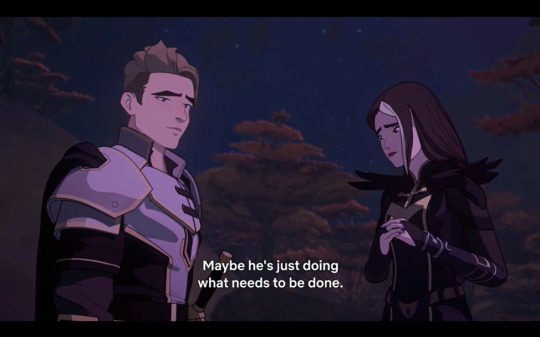
She places all of her faith in Viren because he’s family. She values her family above all else, and finds that Dark Magic is an easy, reliable way to keep it all together.
As a result, her character’s arc helps show what’s fundamentally wrong with Dark Magic—because it’s such an easy fix to all her problems, Claudia is tempted to lean on Dark Magic in more unethical ways.
In Lord Acton’s famous maxim, power tends to corrupt, and absolute power corrupts absolutely.
And Dark Magic is power incarnate.
Dark Magic is far more versatile than Primal Magic. Whereas Primal Magic lets a mage use spells by harmonizing with nature, Dark Magic is simply about harnessing power in its raw form.
It’s not merely a shortcut that lets you bypass having an Arcanum or a Primal Stone. Certain practices within Dark Magic are not possible elsewhere.
If Callum had mastered Sky Magic by the time Rayla goes to save Pyrrah, he could have made short work of Soren and his forces with his winged form, but actually freeing the dragon from its chains would have still been no easy task.
But with Dark Magic, all Callum needed was a spell. A single spell and the chains are turned into snakes. The soldiers are driven away, and the dragon is free.

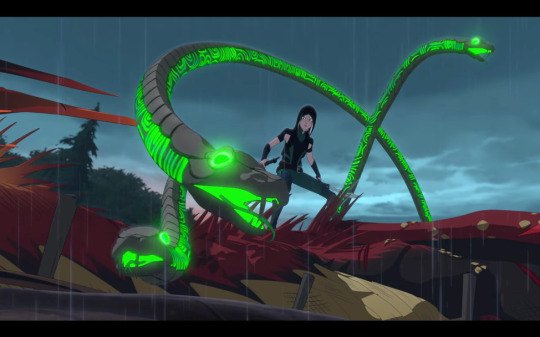
You can’t do that with Primal Magic.
We haven’t seen a limit to what Dark Magic can do for you, provided you have the materials. It can swap souls.
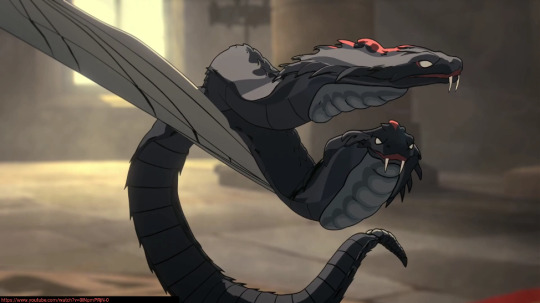
Or take them.

It can provide safe passage across the Breach.

It could taint or even destroy sources of Primal Magic.
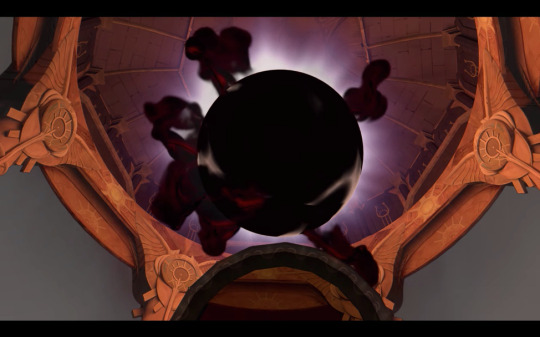
Dark Magic isn’t bad just because it relies on sacrificing creatures. It’s bad because it tempts users with the power to redesign and reorganize the fabric of the world around them, potentially at the expense of Primal Sources themselves.
Dark!Callum sums up this temptation perfectly:
“You can have unlimited power. And you can choose what to do with that power. You can make a real difference in the world!”

And sadly, it’s a temptation that Claudia falls for time and time again. Once Claudia wields this power, she’s tempted to abuse it, even if it just begins as an attempt to protect her loved ones. And the more she abuses it, the harder it is to stop.
She shows that the temptation to use Dark Magic and how it distorts the world is what makes the practice so terrible and so terrifying that it shouldn’t be used in any circumstance.
@batfamfan1(who gave me permission to bring up our conversation here) had argued that Claudia’s use of Dark Magic was different from Viren and Aaravos, because she at least uses Dark Magic for good (or what she sees as good). That is, she cures or protects her family.
However, I’d argue that it’s not as simple as that. Claudia indeed sacrifices a deer because she wanted to cure Soren, but had she ever considered what Soren wanted? There’s a reason why, for instance, doctors disclose all relevant facts and treatments to a patient and let them make an informed decision, even if the doctor believes only one of those treatments is the best option. It’s not just about a cure, it’s about the agency of the patient. This becomes even more important when it’s not a professional responsibility to a patient, but a duty to respect the free will of someone you love.
Claudia never respects Soren’s agency. Even when he’s come to terms with his condition, she has not. She wants to keep trying to find a cure even while he’s beginning to move on. And, when she does find a cure, she never tells him about it beforehand, never tells him what it would cost, and never tries to get his approval.
This is different from Rayla in 2x08 who, in spite of knowing it’s a bad idea to let Ezran leave on his own, lets him go. Or Callum, who, in spite of thinking that Rayla staying on the Spire is a bad idea, simply lays out all the relevant information to Rayla and lets her make the decision for herself.
This is because, when you love or care about someone, that has to include letting them make their own choices, even if you don’t agree.
Claudia never does this with Soren because, again, it’s not about him, but about her. She has a personal need, however tragic, to keep her family together and healthy.

She’ll do what she can to fill that need, even if she has to play goddess to do so.

For that reason, she isn’t using Dark Magic for someone else’s benefit but her own. Much like Viren, whose stated goal to defend humanity was really just a cover for his desire to be powerful, Claudia’s goal to protect her family is really about protecting her state of mind. To do that, she needs to become powerful as well.
Her inability to see just what’s wrong with Dark Magic, combined with her need to maintain this portrait of a healthy family alive, means she will always be tempted to try another Dark Magic spell that will simply cure everything and will never look back once she tries it.
This is different than, for instance, Callum. As I describe here, he’s seen the world that Rayla shows him and begins to see magic the way she does. It’s not a tool; it’s a phenomenon, a vibrance or a spirit to things.
He understands, at least in an unstated way, that there’s something fundamentally wrong about Dark Magic, because it threatens that vibrancy.

Interestingly, unlike Claudia, who sees it as an easy solution to everything, Callum is suspicious because it’s too easy:
“But that’s just it! Too easy! Even though I know it’s wrong.”
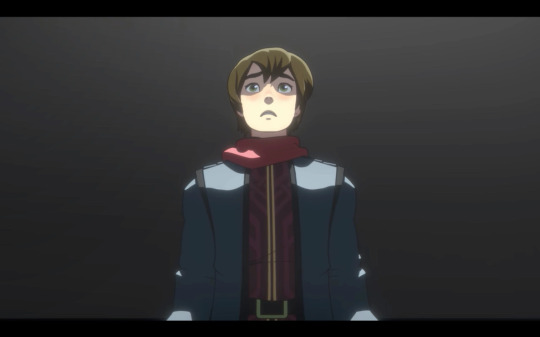
Because of this, Claudia’s character arc helps illuminate what’s wrong with Dark Magic, even if the show doesn’t go out of its way to tell us. It’s a temptation for people who want to be powerful, and it makes them just powerful enough to abuse it.
And before you know it, you’ve lost your way.

#claudia#tdp#the dragon prince#tdp claudia#claudia tdp#callum x claudia#callum#rayla#ezran#soren#viren#dark magic#primal magic
723 notes
·
View notes
Text
Creativity versus Cheating
You may think I’m beating a dead horse about this, but given the number of really stupid takes on this website, I think it needs to be said. With examples! And stories! And ~*fun*~!
A Definition of Cheating
In the end, my erstwhile conversant antagonist mentioned “cheating”. This is a childish way of asserting your disdain for the conversation, but Venomancer has never been a good interlocutor. (This is me being petty and spiteful, but I do have a point here.) “Cheating” gets thrown around a lot as a complaint for why something shouldn’t be allowed. However, to cheat, you have to do three specific things:
Break a rule. Your action has to violate a rule entirely; it can’t simply bend the rule.
Acquire an unfair advantage. Because it required breaking a rule, no one else can benefit from the action you have taken. However, the action still works within the system of other rules to give you some benefit.
Break trust. If you break a rule without intending to do so, it’s a mistake. If you get an unfair advantage but didn’t mean to, it’s a mistake. Cheating has to violate the trust in a system of rules, which demands there be intent behind it.
I point this out because, as I mentioned before, spellcasting in D&D has a very, very long history of people complaining that it is too powerful. Spellcasting. Magic. Seemingly breaking the laws of physics. Magic may or may not itself be cheating (if real, depending on whether or not it actually violates the rules of existence), but its very existence in a codified rule set frequently causes problems, particularly with people who don’t want to play magic-users. The bones of these arguments litter spell descriptions across the editions: feather fall can’t slow down a weapon (so probably not a guillotine blade), magic missile can’t target objects, and other odd bits of wording that make you scratch your head all trace back to some questionable use of a spell.
And yet, it’s not just spells that result in this. Take this conversation from 2006 (D&D 3.5) between a player whose character was a “bareknuckle boxer” Fighter (no idea why he couldn’t have played a Monk) and a DM who was a bit paranoid about getting the run-around from players:
Player: “Can I use Sunder attempts to break opponents’ bones?”
DM: “Hmm... I don’t see why not. However, if you do that, that leaves it open for me to do the same.”
Player: “Y’know, I don’t like that possibility. I’ll just not.”
This is a creative use of established rules to get an advantage. However, it’s not cheating by a long shot: the player is avoiding breaking any rules, the DM approves of the mechanic, and the advantage isn’t unfair because literally anyone can make a sunder attempt (and plenty of monsters can do it better than this bareknuckle boxer could).
You may note that this is the exact same issue as was brought up with the create water in lungs example: the advantage isn’t unfair because others can use the same tactic (this is in fact the poster’s complaint) and the DM had to approve it, meaning either it didn’t violate rules as written (see next) or the DM employed Rule 0 (”the rules are guidelines; tweak or discard them as you wish”). What is “unfair” is that magic users can do this but others cannot; but that’s the same as any class-based issue and is the complaint that’s been leveled at magic users the entire time. But let’s stick with the unfairness at hand: it’s not unfair to other magic users and the DM allowed it, ergo it’s not cheating.
Mistaken Readings: Breaking the Rules but Not Getting a Significant Advantage
Now, here’s the catch. The create water example would vary between editions. I can tell you that in third edition it was against the rules for create water or other conjurations to create objects inside of a creature, while in 5e it requires an open container (lungs themselves are not and the passages into lungs have several ways of being closed specifically to keep water out). All you have to say is “that’s not how the spell works in the rules” and you’re good. But that wasn’t the point of the post, so I’m going to drag it some more.
A great example of such a misreading is a story the bareknuckle boxer player told me of a druid he’d played in high school.. It was the habit of his previous DM to incarcerate his PCs and strip them of all their gear to see how they’d escape from said predicament. My friend’s druid specialized in wood shaping and took Eschew Materials (feat: ignore material or focus components of negligible cost), so he cast goodberry to create some plant matter, then entangle to grow it and wood shape to retrieve the guard’s keys and unlock his cell. Had he a window or were the cell close enough to the outside, he probably wouldn’t have needed the goodberry spell in the first place. As we pointed out to him, though, goodberry didn’t work that way at the time: it wasn’t a Conjuration effect that required berries as material components, but a Transmutation effect that targeted them (making them into healing potions that also filled you), so there were no materials for him to Eschew. This was a key (but subtle) design mechanic to limit the power of a druid, who had no ability to conjure non-creature plants.
Here’s the fun thing, however: 5e’s version of goodberry works exactly the way the player thought it did in 3.5 (save that it’s still an effect of the Transmutation school instead of Conjuration). Any druid worth their salt who likes using plant shaping spells should prepare goodberry if for no other reason than to ensure that they have access to plants. (Sadly, there’s no Eschew Materials equivalent that I know of, but you could find a Divine Focus and hope for the best. Or maybe there is an equivalent that I just don’t know about.)
But here we get into another flaw in the argument: even if it’s not how the rule is supposed to work, it doesn’t exactly grant an unfair advantage. Yes, a druid needs plants to cast a lot of their spells, but not all, and a druid with wood shape (a 2nd-level spell at the time) would be a minimum of 3rd level (I know they were higher because another player was a wild shaper, but let’s just go with that). A 3rd-level druid had a base of 1 2nd-level spell (wood shape) and two 1st-level spells (entangle and goodberry), meaning that if this character had been 3rd-level, he’d have used up all three of his non-bonus spell slots just to break out of a jail cell. (Reminder: cantrips were not at-will in 3.5.) Now, given that I know they could wild shape, I must note that the minimum level for that (5th) would have given him base spell slots of 3/2/1 (not counting cantrips), so he’d still have used half of his spells just to get out of a jail cell.
At that level, though, he could have just shapeshifted into a baboon (Str 15), black bear (Str 19), or a snake (Medium constrictor or Small viper) and gotten out (breaking the door down or slithering through a gap), using a single use of a mechanic to escape and prepare himself for combat. But he didn’t. And his story is better because he didn’t.
And this is where the create water and lungs thing comes back. In the end, if it had been allowed, it would have been a save vs. death. But casters already have plenty of ways of killing creatures at first level -- and often more than one creature at a time, whereas this would have likely only worked on one. Sleep is a great example of an early save or die spell: if the creatures fail their saves, they are now helpless and open for coup de grace-ing (decapitation, stabbination, whatever). Color spray in 3.5 is far and away better than in 5e in this regard because it also makes creatures go comatose, though it doesn’t scale well. (Neither does sleep, for that matter.) Burning hands is an AoE damaging effect. I can go on.
The point is, even misinterpretations of spells tend to run afoul of how cost effective their use is.
In the end, Clerics don’t wander around filling people’s lungs with water because that’s wasteful. You worry about enemy characters trying to kill you in a game about killing things?
Where Rules Mongering Kills Fun
The biggest reason I hate these complaints is not that they make it more difficult to kill things in a game that’s always been about killing things, but in that they try to stamp out any out-of-the-box use for spells. And I mean any.
At the tail end of the Summer of 2005, when I was starting undergrad, another friend of mine recounted tales of a gnomish caster he had played. Two spells featured: dancing lights and Tenser’s floating disk. He had been trying to intimidate some NPC, so rode in on his floating disk and proceeded to use dancing lights to create the image of a humanoid getting disemboweled. Clearly, dancing lights cannot do that: it can create up to four lights or the outline of a single, vaguely humanoid, glowing form. However, if we’re stuck on the dancing lights part, we’ve missed the point: as a gnome caster, he could have done the same thing with silent image anyway (if he had it; I don’t recall what class he was or why he chose dancing lights). No, the issue is with Tenser’s floating disk. Per the spell description:
You create a slightly concave, circular plane of force that follows you about and carries loads for you. The disk is 3 feet in diameter and 1 inch deep at its center. It can hold 100 pounds of weight per caster level. (If used to transport a liquid, its capacity is 2 gallons.) The disk floats approximately 3 feet above the ground at all times and remains level. It floats along horizontally within spell range and will accompany you at a rate of no more than your normal speed each round. If not otherwise directed, it maintains a constant interval of 5 feet between itself and you. The disk winks out of existence when the spell duration expires. The disk also winks out if you move beyond range or try to take the disk more than 3 feet away from the surface beneath it. When the disk winks out, whatever it was supporting falls to the surface beneath it.
It has a range of Close (25 ft. + 5 ft./2 levels), meaning you can direct it to hover anywhere from 0 to 25-75 ft. (1-20th caster levels) from you. If you weigh less than 100 pounds (gear included), at first level you could sit atop it and move at your normal speed. This would accomplish two things: let you ignore terrain problems that require you standing in a square (pressure plates, difficult terrain, etc.) and look really cool but in a fairly typical way for a mage. Since you’re a caster, you’re going to be in the back in marching order, meaning that you’re probably not going to be the one to activate a trap, and your spells have decent range, meaning you don’t have to worry too much about difficult terrain. (This wouldn’t protect you from lava, for the record: remember your convection!) At most, it would let you cross a body of water -- unless the DM said that the surface of the water didn’t count as the surface beneath the disk, which is fair. So minor is this ability that the Elocater prestige class (Expanded Psionics Handbook) gets an equivalent merged with a better version of the levitate spell as a constant effect at first level in addition to a feat and an improvement to previous casting (well, manifesting) ability.
And you might think that all of that’s so minor that surely no one would have complained about it, yet there’s evidence to the contrary. Pathfinder came up with the Magic Trick feat to allow you to do exactly this, but only if you’re third level, pay the feat tax, and put skill points into Fly. Y’know, for the thing that the rules as written would let a light character do at first level and most characters do at second by just casting the spell. Fifth edition won’t let you do it at all: the disk disappears if it comes closer than 20 feet to you (20 ft. is an awfully long distance between you and what amounts to a pack mule you’re leading).
Now, it’s not always that way. 5e’s mage hand is now de jure able to manipulate objects, whereas it wasn’t clear in 3.5, but that’s probably because open/close got folded into it. But for every positive like that, you get two negatives from vociferous people who can’t stand it when other people don’t use spells in specific, pre-defined ways.
In the End...
At the end of the day, having a fun story to tell about how you did something unusual that occurred to you on the spur of the moment and which somehow worked is far and away more important than playing this game like it were a video game, with each spell doing only one thing. And that’s not just coming from me or the people I’ve played with; that’s coming from decades of player stories, fan works, pop culture references, and even D&D novels.
The OP in that old post said that if you can’t abide by their overly narrow, strict interpretation of the rules that maybe you shouldn’t be playing 5e. Ordinarily, I wouldn’t want to sink to their level, but I think I will: if you can’t stand people being creative, you ABSOLUTELY should not be playing a role-playing game of any kind. You should stick to video games and board games. Or Fourth Edition.
12 notes
·
View notes
Text
My Thoughts on the HG Prequel
I just finished reading The Ballad of Songbirds and Snakes and I got to say, my feelings are mixed. Below I have an entire review for the story which included how I felt, the expectations, the biases I had going into the new book, and how I felt after reading. Please note there will be spoilers. Also this review isn’t meant to hurt anyone and if you absolutely love the book so far...good! Enjoy it fully! As an aspiring writer myself and someone who studied in college/loves creative writing I’m well aware that people just have different takes on writing. Glad you are enjoying it :)
Anyways, here it goes…
The Expectations
As the Hunger Games series is one of my favorites of all time, I had a strong bias to like this book. Since it was first announced, without knowing any details, I was extremely excited and optimistic. I re-read the entire Hunger Games series twice beforehand in preparation; once with my fiancé and once on my own. The only thing I really wanted, knowing that it took place during the tenth hunger games, was that the arena reflected how new the hunger games were. Then, when we learned what the series was about, people started voicing some concerns or were disappointed by the plot, instead wanting it to be something like Finnick’s arena, Haymitch’s, Mags’, etc. etc. I was not among this group. However, I understand where they were coming from, because I always thought the idea of the first Quarter Quell (the one where the districts voted for the tributes) was an extremely interesting concept.
Yet I think these things are best left explored in fanfiction as they add nothing to the series and Suzanne Collins did an excellent job just giving us enough information to get the idea. At that point it’d just be a book on details, which could fall short or be a gimmicky, cheap way to keep people reading the series and keep her name relevant. And wasn’t that part of the message in her series, the thing Katniss so heavily criticized that gave a great irony to the books? Who would watch children killing each other for entertainment? Meanwhile, we as the reader are reading these books as a form of entertainment. Plus, Suzanne Collins so skillfully painted the illusion of knowing but not fully knowing their stories that it’s haunting, and I think that is one of the many reasons (along with the battle royale trope being naturally compelling, liking the characters, etc.) that a lot of us are more drawn towards these stories rather than (at least for me) a book on Snow.
That being said, I was not against the idea of a book on Snow because I find villain characters, especially grey ones, to be very interesting to read about, and I was pretty certain Suzanne was going to handle this beautifully, especially since you could already feel this atmosphere coming off of Snow in the Hunger Games series. I know some were really concerned about a Snow redemption arc, but to me it felt very obvious that it couldn’t be and it would be more of him sliding into evil.
I did have other concerns when I read the description for the first time. I could not believe they went with the whole tribute from District Twelve thing again. I loved Katniss and District Twelve, but I did not want Katniss 2.0. I said right from the beginning to my fiancé that she’d have to make the tribute from District Twelve extremely different for me to get on board (though I was holding on faith that Collins would). It just felt cheap and gimmicky to rehash the District Twelve thing, it sort of made me feel the same way I would have if she had written about one of the games I mentioned above. Sure, it’d sell, but it wouldn’t add anything to the series. I was thinking she better not hunt, sing, or have any qualities resembling Katniss really.
Another thing I worried about was the love story they hinted at in the description. It just didn’t make sense to me. Because how was Snow going to ever support the games if from an earlier age he fell in love with a tribute and vowed to protect her? Then later he’s all like pro-hunger games? Just this itself could weaken the entire series if done poorly, because it would weaken the main antagonist’s motives for not only the prequel but also the Hunger Games series as well. I kept thinking either the girl has to die in the arena betraying Snow somehow (which is what I was hoping for), Snow will have to betray her, or perhaps he would have been faking love for her for some sort of personal gain I couldn’t imagine. Either way, I thought it weakened the story's appeal to me. Yet overall I was still excited, desperately waiting for the book’s release.
And now that I have read it, I have to say it felt forced at a lot of parts and lackluster overall…
*Spoilers start here*
My Review:
Suszanne Collins’ writing style is one I’ve always loved and has consistently appealed to me. Even though this book is written in 3rd person (which some may like less if you don’t particularly like third person) it holds up well against the original series. So I really had no complaints in this regard besides the excessive use of songs (felt like fanfiction a bit). I think if you liked the original series and don’t mind third person you’ll feel right at home with her style.
The concerns others had about Snow’s redemption are completely dismissed in this book. Like I had predicted, she writes about his fall into evil, and although it’s not black and white evil (as I don’t like anyways) you can very much tell he’s a bad guy and that the hardships he faced in life only further pushed him towards obtaining status and power. Overall, he feels true to the character when we end up seeing him in the Hunger Games series, and his journey to power fits the images Finnick painted in Mockingjay. He is very well characterized in the book and perfectly unlikable while maintaining an intriguing internal dialogue (although it does occasionally feel tedious, but not enough to bother me; others may feel differently).
The way he is written is very much in line with Collin’s great characterization, one of the reasons I always loved The Hunger Games. All the characters felt like real people. They all had an extreme depth to them and I felt they all resembled people I had actually met in real life. There were little to no characters that relied solely on gimmicky personalities to get by. Even very minor characters that seemed depthless and swallow at first--like Katniss’s prep team--had more to them. So I thought going into this book I had nothing to worry about in that regard. I didn’t even really spare it a thought, but boy was I wrong.
I think Snow and Lucy Grey were the only characters that had (at least partly) the depth that the original Hunger Games cast had. I’ll discuss Lucy Grey later but first let me talk about some side characters. Where to even begin really? There’s a LOT of characters in this book. Frankly, way too many, which I think contributes heavily to the lack of depth in the characters. Honestly there’s so many that the names of characters were hard to keep track of while listening to the audiobook (my hard copy of the book was still in the mail and I didn’t want to wait). Things got a bit clustered in my mind quickly. There were twenty-four tributes, twenty-four mentors, Snow’s family, The Dean and Drs at the university, Snow’s Peacekeeper crew, and the Covey, and those are just the groups that I can cluster together. At least, the ones I remember having names and getting introduced, but I think that’s everyone really important. There was no real time to develop or get to know them really, which made the tributes’ deaths more meaningless as I could barely recall their names. It caused impactful scenes to weaken significantly overall and it made characters serve only to characterize and amplify Snow’s fall into evil.
Here’s what I mean by that. The head Gamemaker, Dr. Gaul, really was the character I hated the most while reading this. She was just evil without reason (one of the weakest villain types with little to no personality besides being evil). She even made creepy rhymes as if she was in some sort of horror movie, and the entire point of her character was to contribute a lot to some of the forced plot points driving Snow’s moral decline. For example, there were all her tests, which seemed contrived and all directly connected to getting Snow to think the Hunger Games was a good idea. She was seemingly supposed to be a Dr. Mengele type character, as this book has a lot of Holocaust-esqe imagery. I’m fine with irredeemably evil villains, but instead of getting the depth that a Dr. Mengele character could offer (as some may know, many children that were part of his experiments actually said he was kind and gave them candy, and I find that deeply haunting to this day.) She is a flat, one-dimensional character whose entire personality could be described with one word: sociopath. Evil people are master manipulators, which is how they get away with evil things. I think at one of the funerals she puts on a good public face, and she seems to have power, money and influence. Yet the book doesn’t show this seemingly present quality nearly enough to make her a haunting character. Instead we get nursery rhythms and clearly driven lessons towards evil at are contrived. Like “Write about what you most liked about the war” or the assignment to improve the hunger games? Like what class is this? Why are they taking it? And why are the young kids of the influential deciding this instead of the influential people themselves?
Another character I feel was just there for Snow’s development and to represent an opposite viewpoint but lacked Collin’s usual depth is Sejanus Plinth. As a District 2 citizen whose family got rich off the war and moved to the Capitol, he is the main opposing viewpoint of the book, presenting Snow with a chance to do the right thing. I’ve seen people say he’s a Peeta-like character, but I completely reject that idea. He lacks in the charm Peeta has, relishes in self-pity (although he’s completely justified in his sadness and has a right to be upset), and while he has a heart like Peeta, he ultimately doesn’t know how to use it. Instead of working within his position to get influence like Peeta so masterfully does, he’s hot-headed and continuously makes poor decisions that ultimately don’t help anyone. It’s like he wants to help but doesn’t know how as he’s driven completely by emotion without reason. He too contributes to some forced scenes, particularly my least favorite in the book; when they sneak into the arena. Overall, he just falls flat for me. Again, I feel I don’t know anything about him beyond what he contributes to Snow’s story line and he doesn’t come across as realistic. It’s like Collins just wrote how someone would normally react to the hunger games, slapped a district number on him and went on her merry way.
I just wasn’t prepared for these sort of characters when the Hunger Games series made even the smallest of characters stand out dramatically. I feel neutral to annoyed by most characters in this novel. I could expand this portion, and maybe if people inquire I’ll elaborate on some of the other characters as I have strong opinions on them, but this post is already getting long, so I’ll move on to Lucy Grey.
Lucy Grey is by far my favorite character even though she is bordering towards being a character from a fanfiction. Not quite a Mary Sue in my opinion but there is a certain connection to fanfiction I made with her. You may have guessed some issues I had with her by reading my expectations earlier in the post, but that has not displaced my love for her. Her personality is very different from Katniss’s, or even Peeta’s or Haymitch’s. She had a different type of charm than all of them, is a natural performer, and seemed more extroverted. Also, the whole idea of the Covey and her “not really” being district was intriguing. It really highlighted the displacement that war can cause and how people can just be in the wrong place at the wrong time. (Although I was confused on how much mobility between the districts there were….and did District Twelve have a fence or no?) It really emphasizes one of the main themes of the book, extreme prejudice against both Capitol and District. Her spot sort of in between really drives home the point that there's literally no difference except extreme poverty, and even then there was poverty in the Capitol, only better hidden. Her bright mood (and clothes), her poised attitude, and her optimism made her endearing. She was confident in her skin yet still held the fear of a sixteen year old going into the hunger games.
There were only two main things that bothered me about her, which was of course the direct connections made to Katniss (which I’ll elaborate on) and the forced “love” story between her and Snow. I suppose that has less to do with her and rather more to do with my dislike of that subplot. And I'm a sucker for some good romantic subplots, but yikes!
I think having one strong connection to Katniss was all that was really needed in this book. I really liked the idea of that connection being the Hanging Tree Song, as I can only imagine how it made Snow feel watching “The Mockingjay” sing it in the propo. Despite me not liking that fact that Lucy Grey is also an enchanting singer as that felt like directly stepping in Katniss’s territory, I did enjoy the little twist of Lucy Grey writing the song. Yet the connections between the two when the plot took us to District Twelve went too far. It felt like it took away all of Katniss’s special places and things. The lake, her katniss roots, her gift towards music, her fondness for the meadow, sneaking into the woods, etc. I think one solid connection would have solidified their bond beautifully. Having so many seemed like it was really trying to force the reader to make the connection when it was already painfully clear I guess? Plus, having Lucy stand out at her reaping ( the whole song part read like a bad, contrived fanfiction bit to me) and having people care about her in the Capitol while moral questions of the hunger games were still surfacing made me start to think...isn’t this how the rebellion for Katniss got started? At least partly. I get it’s a different time. Too close to the war. It just felt way too similar. I guess Collins was going for the idea of a lost rebellion that in a way Lucy Grey started that Katniss later revives. Yet it feels like that invalidates the specialness of what Katniss does in the original series as it’s already happened; it just got erased. I guess history repeats itself, but I really just didn’t like it. I could see the appeal to some extent, and it could be a beautiful connection, but it just wasn’t for me.
Now on to the plot, which is the last thing I’ll talk about as this post is getting ridiculously long. A lot of the plot felt very forced or contrived, which was another shocker coming from Collins because her pacing and plot was done really well in the original series. Of course, a lot of this was driven by Dr. Gaul and Sejanus Plinth as the entire plot hinged on the moral debate of the hunger games these two represent. Other plot points just hinged on what happened to establish the games. I mean the rebel bomb explosion seemingly only happened to change the terrain so Dr. Gaul can then bring up the idea of the different arena and how that made the tributes act differently, thus creating the crazy arenas we see later in the series. I do have some praise for how Collins established the disparities between the earlier hunger games and the ones we see in Katniss day. From the way they lock the tributes up, don’t feed them, the spotty coverage of the arena, etc. All of that was exceptionally well done. The only complaint I have was that so many tributes died before they even got to the arena (though not because I wanted to see them fight). I had been expecting one to escape or something to further establish that this was new territory and was waiting to see how they handled it in earlier times, but I wasn’t expecting that many to die before the arena got started. It just seemed like a huge Capitol failure that they advertised loudly. I really wasn’t expecting that level of incompetence, just an escaped tribute that threatened to embarrass or harm the fragile beginnings of post-war Panem. Instead, most of the pre-arena stuff felt disastrous. A lot of the mentors' deaths felt forced, and it was weird that the academy never really came under fire at all from all the rich and powerful parents whose children were getting killed because of the mentor experiment. Like it seemed there should have been some interaction there, but there wasn’t. Maybe some was passively mentioned but still, it could have been a whole subplot that further established the debate of the hunger games.
While the pre-arena up to the break-in to the arena felt like the most forced part of the book and certainly I felt it needed more workshopping plot wise, it also harbored some great and powerful scenes, like Arachne pulling the sandwich away from the tribute while she was starving and laughing about it. Basically, all those interactions of poverty and captivity meeting the citizens of the Capitol were done well, but nothing spectacular (unlike the scene of Katniss screaming at Buttercup at the end of Mockingjay which is heart wrenching.)
The last plot point I’ll talk about is the “love” story. I wasn’t a fan, but it was sort of what a lot of the plot hinged on and led to the great scene at the lake between Snow and Lucy Grey. How easy it was for him to betray his “love” for status. This led to some of the most interesting and evil internal monologue Snow had in the entire book. I honestly feel the ending scene, the interaction Snow had with the jabberjays and Mockingjays in District Twelve, and the lynching scenes were among the strongest and most memorable.
The love story again felt forced (sorry I’m using that word so much it’s just so accurate) into the story. This hindered the book from having a strong plot in the same way the weaker characters caused forced interactions and plot points to move things along. Yet at the same time the kind of abusive and lackluster nature of their relationship throughout the book fit perfectly with the ending. Unfortunately, it didn’t really make it very compelling for the reader. Luckily Lucy’s personality kept my interested during these parts. I wouldn’t say their relationship was poorly written at all; in fact the way it was written makes perfect sense. I just think the plot relied too heavily on their “love”, which was gross because of the way Snow is, and the reader knew it had to inevitably end in some kind of betrayal or reveal that there was no love at all. This creates tension for the reader, but I kept wondering: if the love plot had been ditched could we have gotten a stronger plot altogether?
So overall, like I’ve said I’m really conflicted. I know I focused heavily on things I didn’t like, but honestly the book was well written in some regards, plot bouncing between really compelling and a little contrived, the two main characters being written well enough but other characters not so much. Some connections between Lucy Grey and Katniss made at the end were powerful, I loved the Covey, Collins still excelled at writing a lot of the social issues/scenes in the book, and honestly the idea of Lucy Grey being completely forgotten in the Districts that hurts my soul a little. Nothing compared to the feelings I got in any of the Hunger Games books but there’s still something there.
I really hope someone made it through this long ass post. The book was entertaining. I mean I listened to all 16 hours of the audiobook in like a day. I can’t wait until my hardcover comes so I can look through it. Maybe once I know what I’m getting into I can enjoy the book a little more than I did, because right now it’s sitting at very average for me. Maybe I went in with my expectations too high? I certainly like the Hunger Games a lot more and probably always will. Honestly, I love new content, but I’m also the type that likes firm, planned endings to stories (even though it hurts to let things end and the fandoms can suffer from lack of content). I think fans can oftentimes get caught up in what they want and pressure the writer into writing more, which ends up a disappointment since it wasn’t originally planned in the series from the beginning. While I don’t think this is by any means the case with Suzanna Collins or that Lionsgate even pressured her to write this book (I don’t like conspiracies of that sort of thing as a writer myself that plans to have a series in which a book comes out many years after the original part of the series is released), I do wonder if this is the end of the Hunger Games for good. I sure hope so, especially if she would be writing about the other victors. I love them too much and really don’t want to feel similarly about their books, and like I said at the beginning, it wouldn’t add to the series just to my guilty pleasure lol.
Hope you all have enjoyed your reading of the book more than I did :) Again sorry if I wrote anything to upset you! Please if you loved this book ENJOY IT! I’m actually kind of jealous if you did. Feels like missing out on something special.
#The Ballad of Songbirds and Snakes#suzanne collins#tbosas#lucy grey#coriolanus#Dr. Gaul#Sejanus Plinth#Hunger Game Prequel#Hunger Games#Katniss#Peeta#hunger games series#review#catching fire#mockingjay#books#writing
123 notes
·
View notes